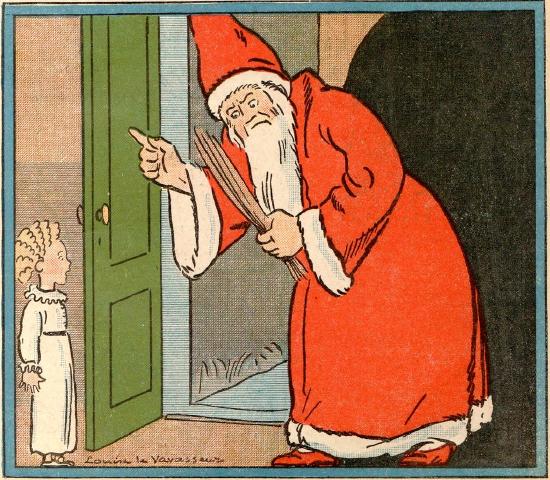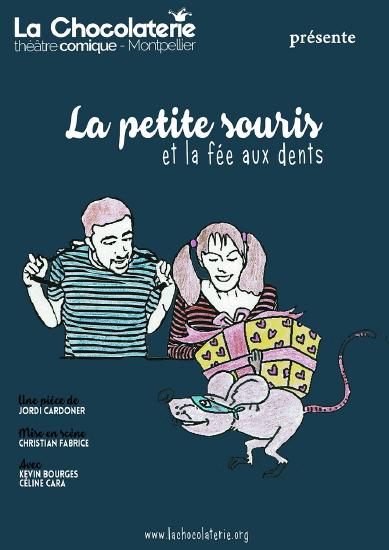9.2: Raconter des histoires au passé
- Page ID
- 120686
In this section, you will learn how to use l'imparfait to describe past states, settings and background actions.
Listen to the audio clips that follow on this page to hear the French pronunciation of vocabulary and examples presented.
On étudie !
 "Pere Noel" by pilllpat (agence eureka) is marked with CC PDM 1.0
"Pere Noel" by pilllpat (agence eureka) is marked with CC PDM 1.0 Ship at Sea 1937." by Halloween HJB is marked with CC0 1.0
Ship at Sea 1937." by Halloween HJB is marked with CC0 1.0 "La petite souris et la fee aux dents 2" by Théâtre La Chocolaterie is licensed under CC BY 2.0
"La petite souris et la fee aux dents 2" by Théâtre La Chocolaterie is licensed under CC BY 2.0L'imparfait is used to describe situations, states, and conditions that were ongoing in the past, with no definite beginning or end, like actions that are part of a setting or background.
The imperfect is used to describe actions that were in progress at some time in the past. It can thus be used to describe the setting or background actions occurring while other specific and isolated actions (expressed with the passé composé) occur.
In English, the use of the imperfect is often expressed with: "was, were" + doing something. For example, "They were eating when...."
| Infinitif | Racine (1re personne, pl., présent = nous) | Terminaisons |
|---|---|---|
| aimer | aim- | -ais, -ais, -ait, -ions, -iez, -aient |
| avoir | av- | -ais, -ais, -ait, -ions, -iez, -aient |
| être | ét- | -ais, -ais, -ait, -ions, -iez, -aient |
| vouloir | voul- | -ais, -ais, -ait, -ions, -iez, -aient |
| se sentir | me, te, se, nous, vous, se sent- | -ais, -ais, -ait, -ions, -iez, -aient |
| croire | croy- | -ais, -ais, -ait, -ions, -iez, -aient |
| voir | voy- | -ais, -ais, -ait, -ions, -iez, -aient |
| recevoir | recev- | -ais, -ais, -ait, -ions, -iez, -aient |
Pour en savoir plus sur l'imparfait et les verbes voir, croire, et recevoir.
| Français | Anglais |
|---|---|
| croire au Père Noël | to believe in Santa Claus |
| croire aux fantômes | to believe in ghosts |
| croire aux extra-terrestres (petits hommes verts) | to believe in extra-terrestrial aliens (little green men) |
| croire aux monstres | to believe in monsters |
| croire à la petite souris | to believe in the tooth fairy |
| croire aux contes de fées | to believe in fairy tales |
| croire au lapin de Pâques | to believe in the Easter bunny |
Flashcards
Study the Quizlet vocabulary flashcards. Listen and repeat the French pronunciation.
Pour lire ce que certaines personnes croyaient quand elles étaient enfants, lisez leurs anecdotes dans Quand j'étais petit, je croyais que...
 "This work" by Katherine Ab, Pixabay is in the Public Domain
"This work" by Katherine Ab, Pixabay is in the Public DomainOn pratique !
Activité A
Grand-père évoque son enfance. Le grand-père de Thomas raconte ses souvenirs. Complétez ces phrases à l'imparfait pour savoir ce qu'il dit.
- Je (vivre) à la campagne dans une petite maison.
- Nous (ne pas avoir) beaucoup d'argent, mais on (être) contents.
- Les enfants (nager) dans la rivière près de la maison.
- Je (partager) une chambre avec ma sœur.
- Mes parents (travailler) beaucoup.
- Nous (chanter) des chansons traditionnelles.
- Je (vouloir) être un joueur de Baseball.
- Tout le monde (savoir) pêcher.
- On (produire) ses légumes dans le potager.
- Nous (mettre) nos vêtements propres le dimanche.
Activité B
Décrire les actions progressives et les actions de fond. Quand tu étais enfant, qu'est-ce qu'on faisait quand ... ?
- C'était ton anniversaire.
- C'était une fête nationale.
- C'était une célébration culturelle ou religieuse.
- C'était les grandes vacances.
- C'était la naissance ou le décès d'un membre proche de la famille.
Pensez aux questions :
- Que jour c'était ?
- Quel temps faisait-il ?
- Que faisaient les gens ?
- Qu'est-ce qu'on voulait ?
- Comment te sentais-tu ?
- À quoi pensais-tu ?
Activité C
Décrivez votre maison et votre quartier d'enfance.
Activité D
Posez ces questions à un(e) partenaire, et continuez la discussion avec vos propres questions.
Modèle :
Listen to the model and then ask the questions below with your partner.
To practice, you can listen and repeat the example.
Étudiant(e) 1 : Est-ce que tu croyais au Père Noël quand tu étais petite et jusqu'à quand ?
Étudiant(e) 2 : Oui, je croyais au Père Noël jusqu'à mes 7 ans. Et toi ?
Étudiant(e) 1 : Moi non. Je n'y croyais pas.
- Est-ce que tu croyais à la petite souris ?
- Croyais-tu au lapin de Pâques ?
- Croyais-tu aux monstres ou aux fantômes ?
- Est-ce que tu avais un(e) ami(e) imaginaire ?
- Est-ce que tu voyais souvent tes amis en dehors de l'école ?
- Est-ce que tu croyais au lutin ?
- Est-ce que tu avais peur du noir ?
- Est-ce que tu recevais beaucoup de cadeaux pour ton anniversaire quand tu étais petit(e) ?
Activité E
Complétez.
- Les enfants croient au Père ____, mais pas les adultes.
- Quand ma fille était plus petite, elle croyait aux ____ imaginaires ou extraterrestres et elle en avait très peur.
- Ma nièce toujours au ____ de Pâques.
- La maison de mon enfance était très grande et très ancienne, alors je croyais qu'il y vivaient des ____.
- Je ne sais pas si cet enfant croit à la petite ____. En tous les cas, elle aime trouver un cadeau sous son oreiller.
On approfondit !
Use the following resources to type accents and/or search for words:
- Accents: ç, à, é, è, â, ê, î, ô, û, ù, ë, ï, ü
- Dictionnaire français-anglais


